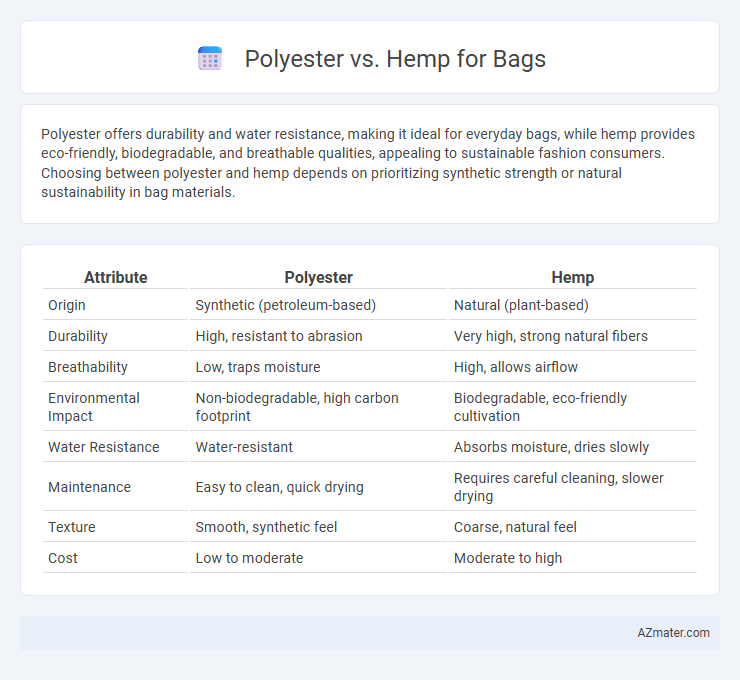Polyester offers durability and water resistance, making it ideal for everyday bags, while hemp provides eco-friendly, biodegradable, and breathable qualities, appealing to sustainable fashion consumers. Choosing between polyester and hemp depends on prioritizing synthetic strength or natural sustainability in bag materials.
Table of Comparison
| Attribute | Polyester | Hemp |
|---|---|---|
| Origin | Synthetic (petroleum-based) | Natural (plant-based) |
| Durability | High, resistant to abrasion | Very high, strong natural fibers |
| Breathability | Low, traps moisture | High, allows airflow |
| Environmental Impact | Non-biodegradable, high carbon footprint | Biodegradable, eco-friendly cultivation |
| Water Resistance | Water-resistant | Absorbs moisture, dries slowly |
| Maintenance | Easy to clean, quick drying | Requires careful cleaning, slower drying |
| Texture | Smooth, synthetic feel | Coarse, natural feel |
| Cost | Low to moderate | Moderate to high |
Introduction to Polyester and Hemp Bags
Polyester bags are crafted from synthetic fibers known for durability, water resistance, and lightweight properties, making them popular for everyday use and promotional items. Hemp bags, made from natural fibers derived from the Cannabis sativa plant, stand out for their eco-friendly, biodegradable qualities and robustness, appealing to environmentally conscious consumers. Both materials offer distinct benefits in terms of sustainability, strength, and texture, influencing consumer choice based on usage and environmental impact.
Material Origins: Polyester vs Hemp
Polyester is a synthetic fiber derived from petroleum-based polymers, making it a non-renewable resource with a high environmental footprint due to fossil fuel extraction and energy-intensive production. Hemp, on the other hand, is a natural fiber obtained from the stalks of the Cannabis sativa plant, known for its rapid growth, minimal pesticide requirements, and biodegradability, positioning it as a sustainable alternative. Choosing hemp over polyester for bags supports renewable material use and reduces dependency on fossil fuels, aligning with eco-friendly and sustainable product goals.
Durability and Longevity Comparison
Polyester bags offer high durability with strong resistance to abrasion, water, and UV damage, ensuring extended use in various environments. Hemp bags, while slightly less resistant to abrasions, provide exceptional longevity due to their natural fiber strength and biodegradability, becoming softer yet retaining durability over time. Choosing between polyester and hemp depends on priority: synthetic endurance versus eco-friendly resilience.
Environmental Impact and Sustainability
Hemp bags have a significantly lower environmental footprint compared to polyester bags due to hemp's rapid growth, minimal water usage, and natural biodegradability. Polyester, derived from petroleum, contributes to microplastic pollution and relies heavily on fossil fuels, making it less sustainable over time. Choosing hemp bags supports renewable agriculture and reduces plastic waste, aligning with eco-friendly and sustainable consumption practices.
Water Resistance and Weather Performance
Polyester exhibits superior water resistance compared to hemp, making it ideal for bags exposed to wet conditions due to its synthetic fibers that repel moisture effectively. Hemp, while naturally breathable and eco-friendly, absorbs water more readily and may take longer to dry, which can impact durability and comfort in humid or rainy weather. For optimal weather performance, polyester bags maintain structural integrity and resist mildew better than hemp, although hemp offers better biodegradability and UV resistance.
Comfort and Aesthetic Appeal
Hemp bags offer superior breathability and a natural, textured look that enhances comfort and aesthetic appeal, making them ideal for eco-conscious consumers. Polyester bags provide a smooth finish, durability, and vibrant color retention but may lack the breathable comfort and organic charm of hemp. Choosing between polyester and hemp depends on prioritizing synthetic strength and color vibrancy or natural comfort and rustic elegance.
Maintenance and Care Requirements
Polyester bags require minimal maintenance, often needing only occasional wiping with a damp cloth to remove dirt and are highly resistant to stains and water, making them ideal for frequent use. Hemp bags demand more careful care, usually necessitating gentle hand washing in cold water to preserve the natural fibers and prevent shrinkage or damage. Over time, hemp fibers may soften and develop a unique texture, while polyester maintains its shape and color more consistently under regular use and washing conditions.
Cost Analysis: Polyester vs Hemp Bags
Polyester bags generally have a lower production cost due to the inexpensive raw materials and efficient manufacturing processes, making them more affordable for mass production. Hemp bags, while costlier upfront because of sustainable farming practices and labor-intensive processing, offer durability and biodegradability that reduce long-term environmental impact expenses. The cost analysis should consider initial price differences alongside lifecycle value, with polyester favoring budget constraints and hemp appealing to eco-conscious consumers seeking sustainable investment.
Popular Uses and Target Markets
Polyester bags dominate the fashion and retail industries due to their affordability, durability, and water resistance, making them ideal for promotional giveaways, grocery shopping, and everyday use. Hemp bags are favored in the eco-conscious market for their biodegradability, strength, and natural aesthetic, appealing to consumers focused on sustainability in lifestyle and outdoor products. Retailers targeting environmentally aware customers emphasize hemp bags, while mass-market brands prioritize polyester for cost-effective production and vibrant design options.
Which is Better? Final Verdict
Polyester bags offer high durability, water resistance, and cost-effectiveness, making them ideal for everyday use and mass production. Hemp bags provide superior sustainability, breathability, and biodegradability, appealing to eco-conscious consumers seeking natural fiber alternatives. The better choice depends on prioritizing environmental impact with hemp or performance and affordability with polyester.

Infographic: Polyester vs Hemp for Bag
 azmater.com
azmater.com